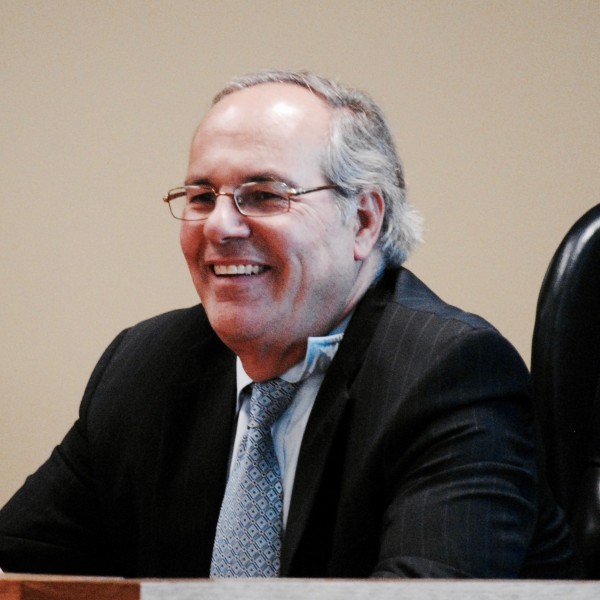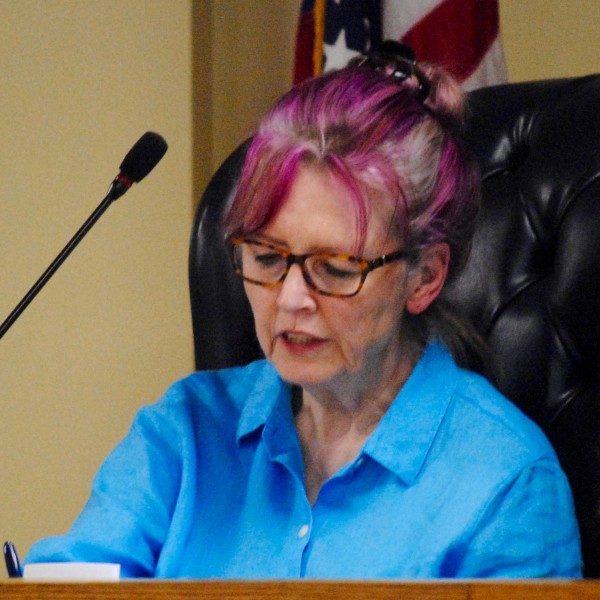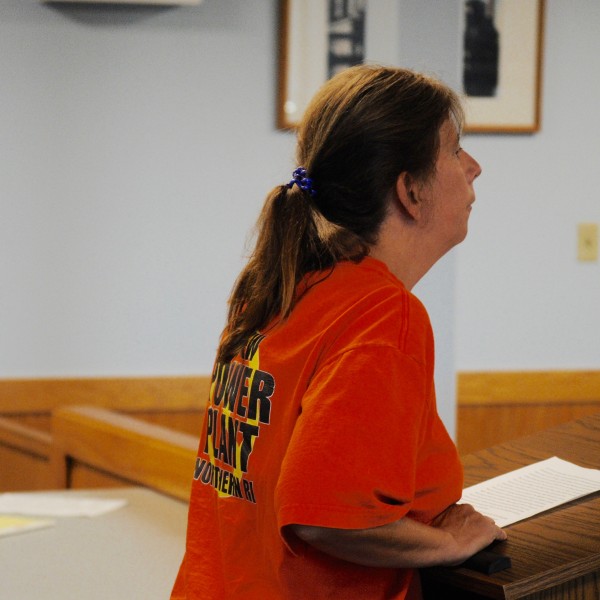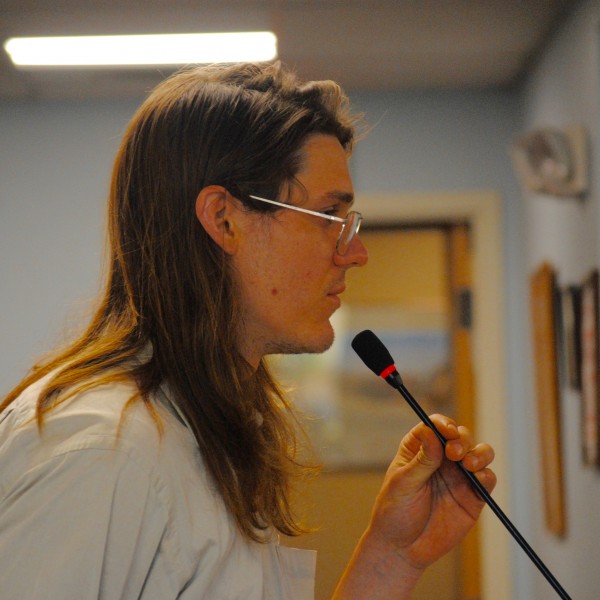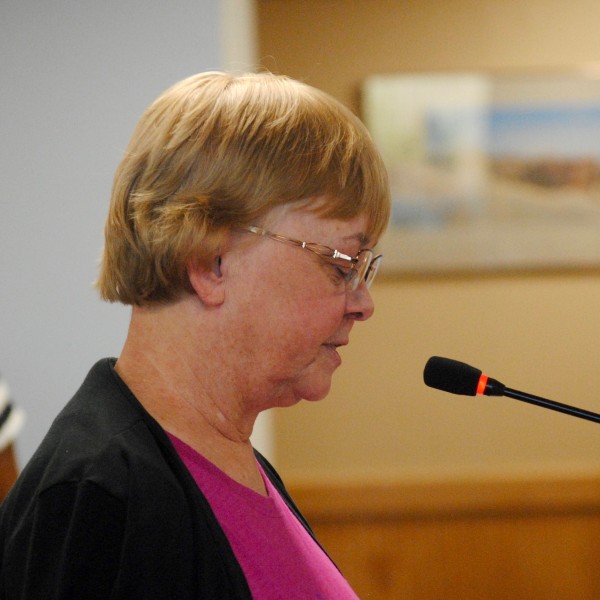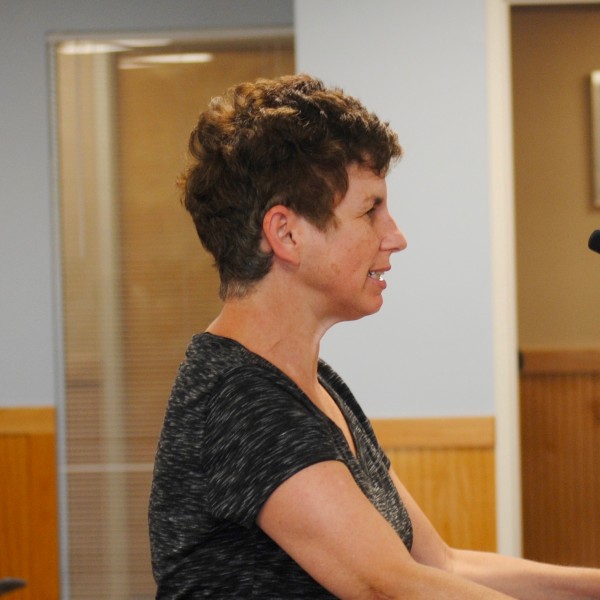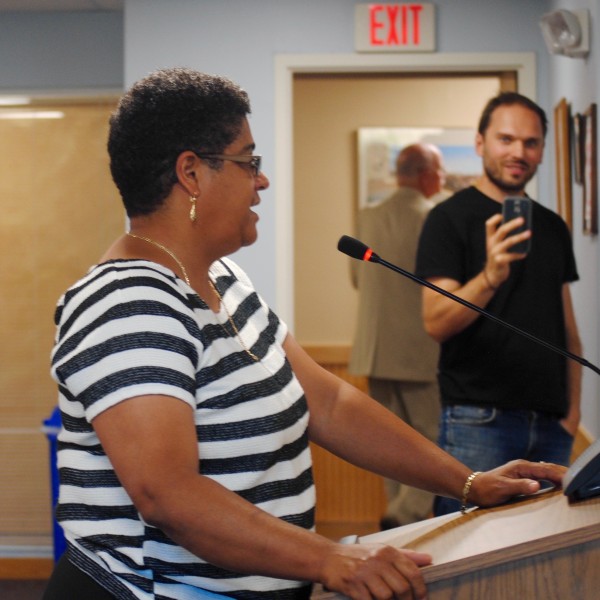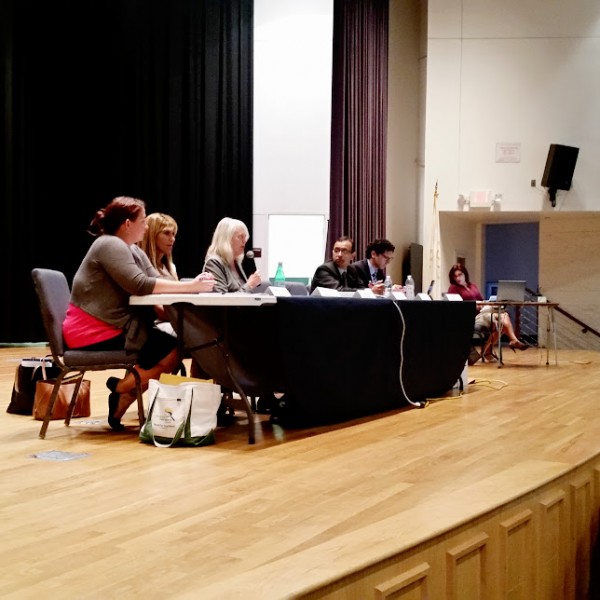 The Energy Facilities Siting Board (EFSB) public hearing in Warwick Wednesday evening, coming near the end of the process to decide the fate of Invenergy‘s proposed $700 million fracked gas and diesel oil burning power plant, was filled with almost philosophical reflection, with many speakers, who have sat through dozens of EFSB, town council, zoning and department meetings and honed their public speaking skills, commenting with a battle weary determination and steely resolve.
The Energy Facilities Siting Board (EFSB) public hearing in Warwick Wednesday evening, coming near the end of the process to decide the fate of Invenergy‘s proposed $700 million fracked gas and diesel oil burning power plant, was filled with almost philosophical reflection, with many speakers, who have sat through dozens of EFSB, town council, zoning and department meetings and honed their public speaking skills, commenting with a battle weary determination and steely resolve.
Perhaps no one summed up the emotional toll of the process better than Kerri Fagan, who reminded the board of the promises made regarding the fairness of the process by elected officials such as Governor Gina Raimondo and Senator Sheldon Whitehouse as well as by the board members themselves, then launched into a long list of irregularities and seeming violations of the process that tend to favor Invenergy and disfavor the towns people.
Six of the twelve advisory opinions, said Fagan, maintain that, “Invenergy did not provide enough information before the deadline for them to submit an appropriate advisory opinion.”
Fagan explained that the process allows for the RI Public Utilities Commission advisory opinion, “to be completed by a single person, [Herbert DeSimone Jr]” after one of the other members recused themselves because they “previously expressed support for the project.” The process of having one person make that decision was questioned, said Fagan, but was ruled appropriate by the single board member, DeSimone Jr.
“The process allows Invenergy representatives to falsely testify at open meetings,” said Fagan. “Did the process require them to acknowledge their misinformation? No. There are probably people who still believe they will receive great rate savings,” if the power plant is built. Fagan says the process also allowed Invenergy to falsely advertise meeting locations and times.
The process, said Fagan, requires that the Burrillville Town Council remain neutral throughout the process, yet Governor Raimondo and Senator Whitehouse can express their support for the project.
The process allows attorney Richard Sinapi to represent the Harrisville Water Board, but also lobby against Burrillville Representative Cale Keable‘s EFSB bill on behalf of labor unions, while also allowing his law firm to write a position opposing the Town of Burrillville’s Motion to Dismiss. “The question of conflict of interest was raised, but [Sinapi] continues to represent parties on both sides of this proposal.”
The process allows the Governor and labor unions to advocate for the process based on the jobs it will create, but the EFSB is not charged with creating jobs, but with determining energy needs and judging environmental impacts. “I don’t believe the EFSB has a responsibility to create jobs,” said Fagan,” and I don’t believe it is an appropriate outcome to consider in this setting. Yet the process has allowed this to be a major rallying cry for those that support the process.”
“It is very hard for the residents to respect the process,” said Fagan, “as it seems to be flawed in all areas. The EFSB board works for the Governor. The Governor supports the project. Companies such as Goldman Sachs and General Electric appear to be partners in both this proposed project as well as working with the Governor on statewide initiatives.
“Why has there not been a comprehensive environmental impact statement completed?”
“We can only hope that [the EFSB] will truly listen and read through why this is the wrong project and in the wrong location,” said Fagan, wrapping up, “We hope that you have the strength to fight the state wide politics and make a decision on the merits of the project and truly consider the negative, long lasting detrimental impacts that this project will bring to the Town of Burrillville.”
Other speakers that leaped out at me include Paul Roselli of the Burrillville Land Trust, who praised the RI Department of Enviornmental Management‘s advisory opinion.
Cranston native Rhoda Northup said that this was “not just a Burrillville issue, but a statewide issue. It’s also a Connecticut and Massachusetts issue. “Do we go thirsty and the power plant gets the water?” asked Northup.
Suzanne Dumas
Sally Mendzela spoke about the reality of climate change, and how plants like the one proposed by Invenergy will doom our planet.
Lynn Clark
Mary Gauvin
Smart energy conservation could easily absorb the 10,000 megawatts going offline, the power plant is not needed said Vito Buonomano.
Lisa Petrie explained her concerns as a mother, and explained why she chose to be arrested outside Governor Raimondo’s office.
Donna Woods told the EFSB members, “You do know better” than to approve this plant.
Denise Potvin
This public comment meeting was scheduled for after the last of a dozen advisory opinions were filed with the EFSB. Many who spoke at the hearing pointed out that at least six of the advisory opinions are incomplete, because Invenergy could not supply required information.
The testimony and hearing was also colored by the fact that the Burrillville Town Council will be voting tonight on whether or not to oppose the power plant in a meeting at the Burrillville High School Thursday night, and will be voting on whether to approve or reject a proposed tax treaty between the town and Invenergy on Monday evening. The groups in opposition to the power plant from Burrillville do not want the town council to approve the tax treaty, which may characterized as selling the town for a measly $92 million.
There will be one more public comment meeting, originally to be held on October 3 but not postponed, date to be determined due to Invenergy’s request for a thirty day extension as they work to secure a water source for their plant. In the meantime, the EFSB board will hold a meeting to decide on two motions to dismiss Invenergy’s application, one from the Town of Burrillville and the other from the Conservation Law Foundation (CLF) based on Invenergy’s incomplete application and failure to provide adequate or timely information when requested.
Here is the video of all the speakers:
Richard Dionne said that Invenergy should be required to submit all requested information.
Doug Geblinske of TEC-RI spoke in favor of the power plant.
Eugenia Marks, noted environmentalist former head of the RI Audubon Society, spoke against the plant.
David Brunetti questioned Invenergy’s “cicular logic” in determining that Burrillville was the location for this plant.
Kathryn Scaramella questioned the “small but meaningful savings” ratepayers will receive if the plant is built. She pointed out that the extension Invenergy requested was a violation of terms EFSB Chair Meg Curran set out in May, when she said “all deadlines are set in law.”
Mary Jane Bailey said the location chosen for the power plant was rejected when the Ocean State Power Plant was built in the 1980’s. “If it wasn’t right in the ’80s it’s not right now,” said Bailey.
Ben Weilerstein, of the Toxic Action Center said that the same kind of action taking place in Burrillville is what helped defeat the pipeline project in Massachusetts.
Meg Kerr, senior policy director for the RI Audubon Society spoke against the plant.
John McMullen, business agent for the Plumbers and Pipefitters union spoke in favor of the plant, saying there was a need for the energy and the jobs. He said that RI Building Trades supported Deepwater Wind and that a life of temporary jobs allowed him to raise his daughters and send them to college.
Irene Watson noted that her community’s public speaking skills have improved because of the countless meetings they’ve been to.
Kenneth Putnam Jr spoke from the heart. He’s 76 and 1 day old.
Betty Mancucci
John Anthony Scott
Jeremy Bailey
Roy Coloumbe said he represents two dozen iron workers from Burrillville who support the project.
Attorney Greg Mancini is Richard Sinapi’s law partner and represents the RI Building Trades.
“The power plant will be around 30-40 years from now, says Stephanie Sloman. “”I’ll be dead, you’ll be dead,” she told the EFSB members, “75 percent of the people here will be dead. I’m not trying to be funny.” It’s about the future.
Sloman gave each member of the EFSB this picture, to remind them of the species they will either help to save or destroy, depending on how they decide on the power plant.

Cynthia Crook-Pick compared the power plant to 38 Studios, both are being pushed forward with inadequate information.
Karen Palmer
Jason Olkowski
]]>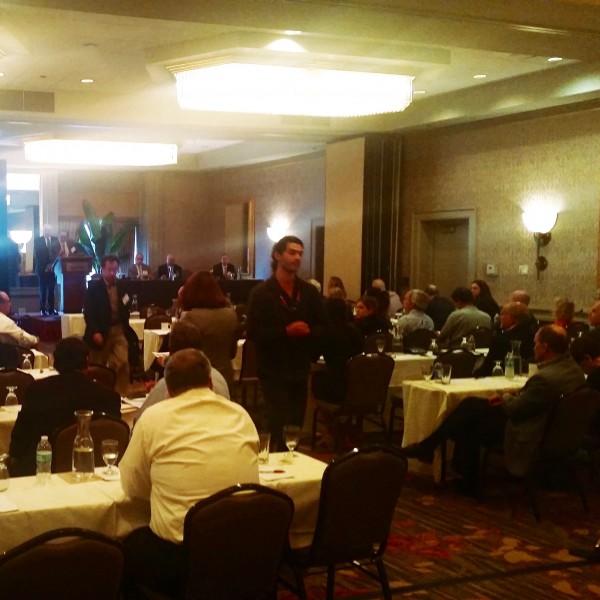 The Consumer Liaison Group (CLG) Meeting happens four times a year and its a chance for ISO-NE to exchange information with electricity consumers in New England. ISO-NE is the group that regulates our electricity markets and keeps the lights on by coordinating electricity generation and transmission. They run billion dollar markets and interact with companies like Spectra Energy, Invenergy, National Grid and Deepwater Wind. Pretty much every aspect of the process of getting electricity to your television is touched upon by ISO-NE in some way.
The Consumer Liaison Group (CLG) Meeting happens four times a year and its a chance for ISO-NE to exchange information with electricity consumers in New England. ISO-NE is the group that regulates our electricity markets and keeps the lights on by coordinating electricity generation and transmission. They run billion dollar markets and interact with companies like Spectra Energy, Invenergy, National Grid and Deepwater Wind. Pretty much every aspect of the process of getting electricity to your television is touched upon by ISO-NE in some way.
 The latest meeting of the CLG, in Providence on Thursday, featured a panel discussion with representatives from the four companies mentioned above. The panel was pulled together with the help of Douglas Gablinske, executive director of The Energy Council of Rhode Island (TEC-RI) an advocacy group for energy company concerns. Readers of RI Future may remember that Gablinske was a vocal opponent of Cale Keable’s bill to reform the Energy Facilities Siting Board (EFSB). He was also the only speaker at the RI Public Utilities Commission (RIPUC) to speak in favor of the pipeline tariff.
The latest meeting of the CLG, in Providence on Thursday, featured a panel discussion with representatives from the four companies mentioned above. The panel was pulled together with the help of Douglas Gablinske, executive director of The Energy Council of Rhode Island (TEC-RI) an advocacy group for energy company concerns. Readers of RI Future may remember that Gablinske was a vocal opponent of Cale Keable’s bill to reform the Energy Facilities Siting Board (EFSB). He was also the only speaker at the RI Public Utilities Commission (RIPUC) to speak in favor of the pipeline tariff.
Gablinske surprised me by asking if I knew about any planned protests or disruptions. I said I didn’t. He asked me specifically about the FANG Collective. I had no idea of what plans they have, if any, I said. Then Gablinske said that he noticed Mary Pendergast on the list of people who had signed up to attend. Pendergast was sitting in the room, and he soon went over to introduce himself to her.
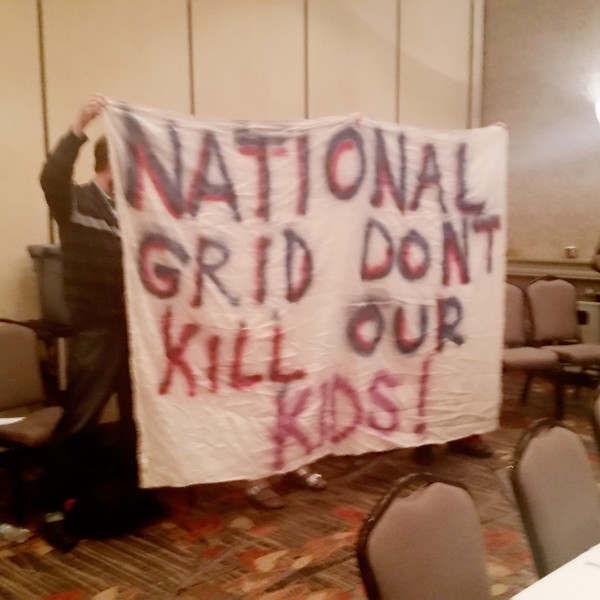
During the course of the presentation there was a disruption. As Invenergy’s John Niland gave his presentation to the room, Mary Pendergast stood and display a small sign that said, “No fracked gas Power plant.” Her protest was silent but it did seem to throw Niland off a bit, as his delivery seemed somewhat distracted.
It was during the third presentation that the disruptions became more pronounced. As Richard Kruse, vice president at Spectra Energy spoke glowingly about the need for bigger and better pipelines in our fracked gas infrastructure future, Kathy Martley of BASE (Burrillville Against Spectra Expansion), Keith Clougherty of the FANG Collective and Sally Mendzela stood up.
“Spectra Energy, Energy for Death,” said Martley as I headed for my camera. “Say no to Invenergy and tell Invenergy to go home,” Martley continued.
As the protest continued, Gablinske took the podium and said, “You have a right to be here but not be disruptive” as Clougherty continued to speak.
Lennette Boiselle, an ally of Geblinske and a lobbyist for the Northern Rhode Island Chamber of Commerce got up and left the room, presumably in search of security. Readers might remember Boiselle as the person arguing against democracy at the public comment hearing concerning Cale Keable’s EFSB bill.
“The political correctness, of not allowing other people to talk is sweeping through this country,” said Geblinske, “It’s an incorrect assumption, this gentlemen has the right to speak…”
“We’ve been listening to you our whole lives, Pal,” interrupted Sally Mendzela.
Gablinske ultimately offered to set up a forum where “both sides” could be heard but it is unknown if this will actually happen. The protesters took their seats, no one was ejected from the forum, and Kruse finished his talk.
Amazingly, though, that wasn’t the end. During a brief question and answer period at the end of the presentations, Gablinske called on Clougherty to ask a question!
“I would ask for a question, not a speech or a statement,” said Gablinske, when he realized who he had called upon.
Clougherty then asked Niland, Kruse and Bill Malee, a National Grid VP, “Do your companies have any money set aside for restitution for the millions of people who are going to be displaced and killed by the infrastructure projects you all are proposing?”
There is no good answer representatives from these companies can give, yet Niland attempted one. As expected, it was not good.
I found the most interesting talk of the day came from Mary Louise “Weezie” Nuara, External Affairs Representative for ISO-NE.
“The region’s competitive wholesale electricity markets are really designed to maintain reliability through the selection of the most economically efficient set of resources,” said Nuara, but the states “have environmental and renewable energy goals that are beyond the objectives of the wholesale electricity markets.”
What’s happening is that states are setting goals to increase renewables and reduce greenhouse gas emissions (like the goals set out in ResilientRI, but all the New England states have some version of this idea.) ISO-NE is designed to deliver energy as reliably and cheaply as possible. As a market, it cannot deliver renewables or reduce emissions unless those options are cheaper and cleaner. In August, NEPOOL (which represents the interest of the New England states when dealing with ISO-NE) began looking into how to adjust wholesale electricity markets to accommodate the goals of the states. It is NEPOOL’s goal to develop a “framework document” by December 2 to provide guidance to ISO-NE regarding potential changes. (A kind of advisory opinion, if you will.)
What makes this interesting, to my mind, is that if ISO-NE starts taking the climate change concerns of the states into account, plants like the one Invenergy is planning for Burrillville will have a harder time selling their energy into the markets.
ISO-NE is a little over a decade old, but already it’s finding that its systems are in need of being updated over concerns of climate change. By contrast, the EFSB here in Rhode Island was established thirty years ago, in 1986. The RI General Assembly has shown little inclination towards revising the EFSB’s mandate in lieu of climate change.
Below please find all the video from the CLg meeting except for the closing comments.
Rebecca Tepper, chair of the CLG Coordinating Committee and chief of the Energy & Telecommunications Division of the Massachusetts Attorney General’s office introduced keynote speaker Rhode Island General Treasurer Seth Magaziner.
Douglas Gablinske, executive director, The Energy Council of Rhode Island
Jeffrey Grybowski, chief executive officer, Deepwater Wind
John Niland, director of business development, Invenergy
Richard Kruse, vice president and regulatory & FERC compliance officer for Spectra Energy
Bill Malee, vice president of regulatory affairs, for National Grid
ISO-NE Q&A
]]>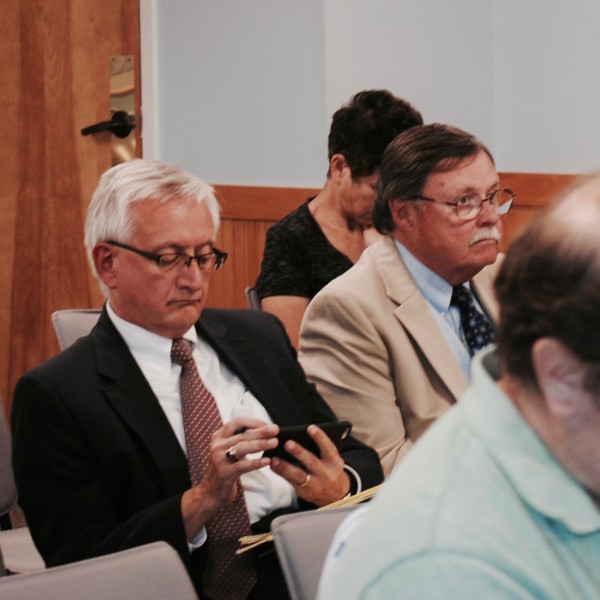
National Grid is requesting that the Rhode Island Public Utilities Commission (RIPUC) approve a 20-year gas capacity contract” with Algonquin Gas Transmission Company LLC (Algonquin) for natural gas transportation capacity and storage services on Algonquin’s Access Northeast Project (ANE Project).”
The multinational energy conglomerate not only wants Rhode Island ratepayers to subsidize the construction of fracked gas infrastructure, they want consumers to ensure that the project is profitable for the company.
Part of National Grid’s 572 page application includes “a Capacity Cost Recovery Provision tariff, which allows the Company to recover all incremental costs associated with the ANE Agreement, as well as the Company’s proposed financial incentive.” Understand that when National Grid says “financial incentives” they are talking about company profits.
The logic that National Grid is using to claim the right to tariffs is that the RIPUC has allowed such charges when it comes to “long-term renewable electricity for retail customers from wholesale power providers.” [emphasis added] In other words, because the government has taken an interest in expanding renewable energy sources like wind and solar, and allowed tariffs to support these efforts, National Grid argues that it should be allowed similar considerations for fossil fuels such as fracked gas.
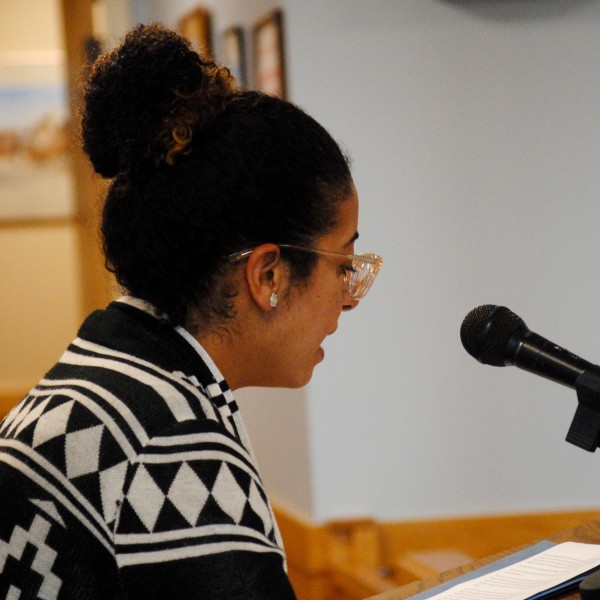
National Grid owns a 20 percent stake in the ANE Project, so Rhode Islanders will be ensuring that the company generates a profit as they buy fracked gas from themselves if the RIPUC approves this request.
A similar tariff stalled in the Massachusetts legislature, where the state Senate unanimously rejected the idea but the session ended before a House vote. The Massachusetts Supreme Court is deciding on the validity of the tariff, since the Massachusetts PUC approved the idea.
National Grid also asked that their request be approved “as expeditiously as possible,” meaning that they want the decision fast tracked. As a result, the public comment meeting held last night at the RIPUC offices in Warwick was the first and last opportunity for public comment, unless RIPUC commissioners Margaret Curran and Herbert DeSimone III decide to hold another public comment meeting. (The third member of the RIPUC board, Marion Gold, has recused herself.) Written comment can be sent to thomas.kogut@dpuc.ri.gov. Mention that you are commenting on Docket No. 4627.
The first speaker of the night, Doug Gablinske of The Energy Council of New England (TEC-RI), was also the only speaker in favor of the idea. Gablinske called the project “a novel approach” and said that “it’s good for ratepayers, for employees, for employers and for business.”

From there, things went downhill pretty quickly.
Calling the tariff an “unprecedented charge” Priscilla De La Cruz of the People’s Power and Light called on the RIPUC to reject National Grid’s request. “Why should consumers take on the risk of a new, unnecessary gas pipeline?” De La Cruz maintained that the entire idea conflicts with the goals of the 2014 Resilient Rhode Island Act. (You can read De La Cruz’s full testimony here.)
Lynn Clark came down from Burrillville, wearing her “No New Power Plant” tee shirt to argue against the proposal. She said that allowing National Grid to pass the costs of their LNG project onto consumers adds “insult to injury” to everyone living in her part of the state.
Other states did comprehensive studies before considering pipeline tariffs, said Nick Katkevich of the FANG Collective, who has been fighting pipeline projects in and around Rhode Island for three years. Massachusetts and Maine have both produced studies that concluded that pipeline tariffs are a bad idea, said Katkevich. “It’s shameful that National Grid wants to have guaranteed profits as part of this,” said Katkevich. “They don’t care about people. They don’t care about people’s utility rates… if they did they wouldn’t put guaranteed profits in there.”
“No one wants these pipelines,” said Katkevich, “across the region people are resisting the first of the three Spectra expansions… There have been 240 people arrested as part of direct action in New York, Connecticut, Rhode Island and Massachusetts.”
If you have an opinion on this project, you can send it to Luly.massaro@puc.ri.gov. Mention that you are commenting on Docket No. 4627.
Below find all the testimony from the hearing.
